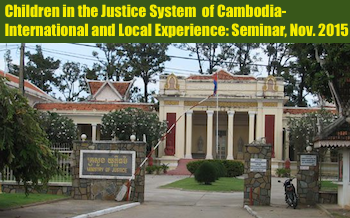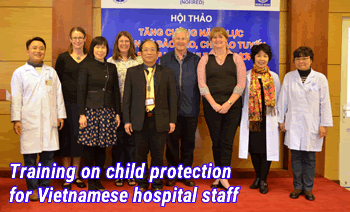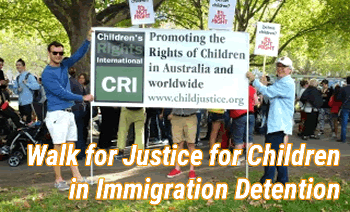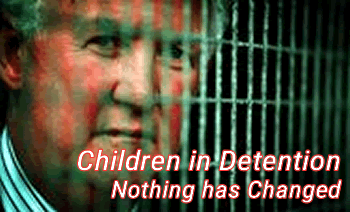GETUP Kids Out Campaign and Call for Social Media Action
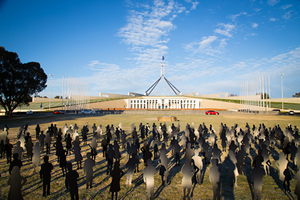 On Thursday (4 June 2015) GETUP delivering the petition straight to Parliament House calling for the immediate release of all children and their families from Australian-run detention centres. In addition to delivering the petition, 231 children's silhouettes were placed along the lawn, as well as the large block letters spelling 'KIDS OUT'.
On Thursday (4 June 2015) GETUP delivering the petition straight to Parliament House calling for the immediate release of all children and their families from Australian-run detention centres. In addition to delivering the petition, 231 children's silhouettes were placed along the lawn, as well as the large block letters spelling 'KIDS OUT'.
The petition was supported by a range of concerned NGOs.
Because not everyone could be in Canberra for the delivery of the petition, GETUP, with the support of agencies such as CRI, would like to encourage as many Australians as possible to also call for the release of the children held in detention. Concerned Australians are asked to participate in a call for social media action.
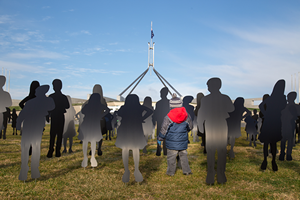 You can participate in the social media action by:
You can participate in the social media action by:
- Post a photo of yourself as a child (or a photo of something special from your childhood) on Facebook, Twitter or Instagram.
- Let people know why this particular moment or object is so special to you.
- Remind them of the 231 children locked in detention, who are being denied these special moments in their childhood.
- Make sure you use the hashtag #kidsout when you post your photo and story. If enough of us take part, we can get our message trending across the country!
Here's an example:
"When I was in fifth grade, my dad surprised me with a puppy, whom I named Sharna. We were best friends, I remember as a kid I felt like I could share anything with her.
But today, there are 231 children who are currently being denied the opportunity to make memories like these for themselves. They are locked in Australian-run detention centres by our government.
All children should be given a chance to enjoy their childhood, that's why I'm calling for our government to get #kidsout today."
Don't forget to encourage your friends and family to take part too!
See more at GETUP: Solidarity Action for Kids Out!
CRI @ Walk for Justice - Children in Immigration Detention, March 2015
Members of CRI participated in the 2015 Walk for Justice to raise the awareness of the public to the plight of children in detention. The walk also aimed to convey to policy makers of all political persuasions that the current policies are in contravention of the United Nations conventions to which Australia is a signatory, and contrary to human rights, the rights of children and the rule of law, all of which Australia purports to support.
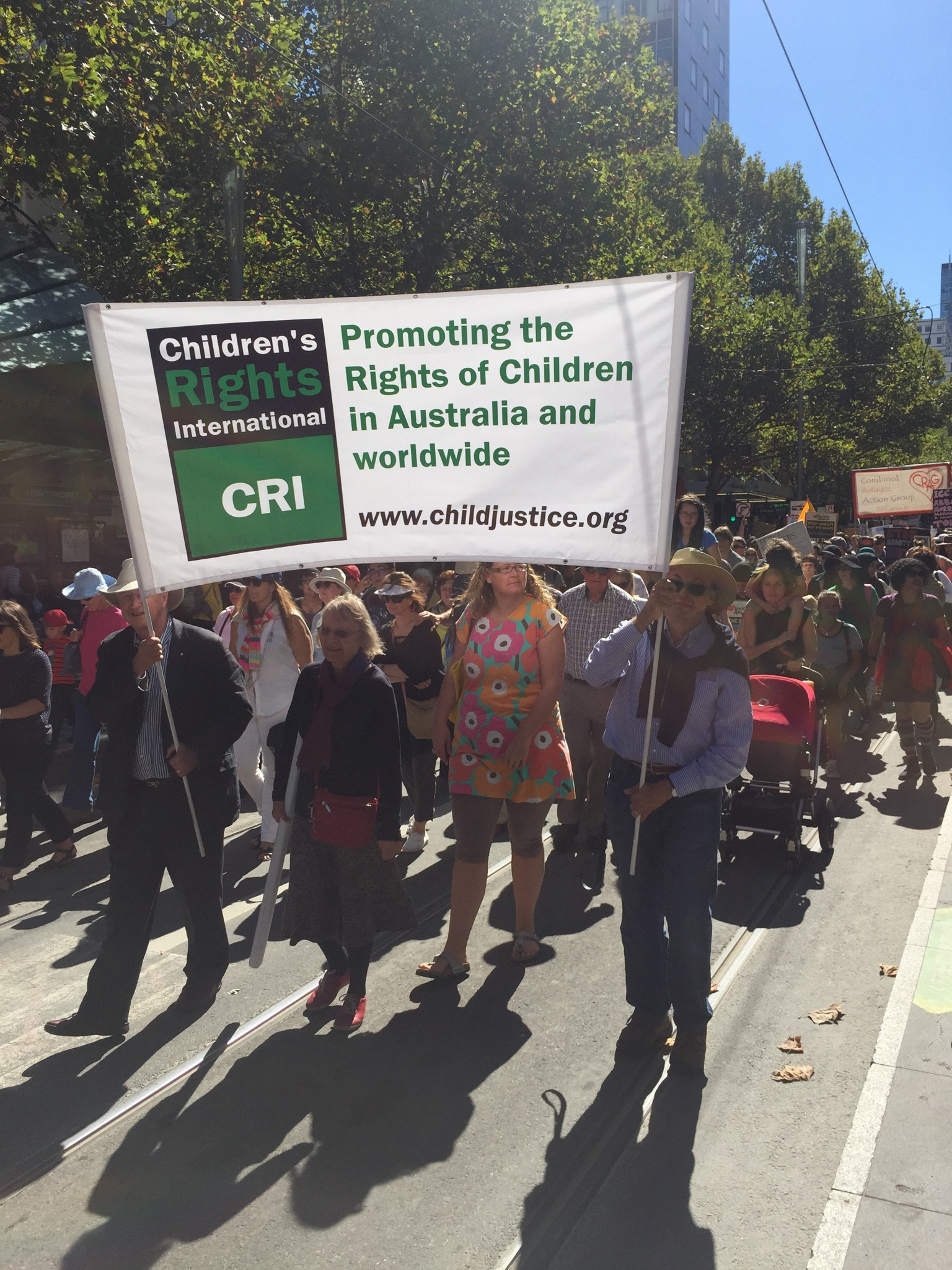
Children in Detention - Nothing has Changed
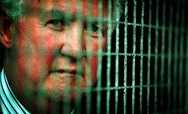 In 1995 the Hon. Alastair Nicholson, then Chief Justice of the Family Court of Australia, raised the issue that Australia was failing its international obligations by holding children in detention centres. His comments were published in an article titled 'Judge damns refugee camps', by Chip Le Grand, The Australian, Thursday 20th of July 1995 (Edition: Sydney). The full text of the 1995 article is reproduced below; it seems that in 20 years little or nothing has changed.
In 1995 the Hon. Alastair Nicholson, then Chief Justice of the Family Court of Australia, raised the issue that Australia was failing its international obligations by holding children in detention centres. His comments were published in an article titled 'Judge damns refugee camps', by Chip Le Grand, The Australian, Thursday 20th of July 1995 (Edition: Sydney). The full text of the 1995 article is reproduced below; it seems that in 20 years little or nothing has changed.
Judge damns refugee camps
AUSTRALIA was failing its international obligations by detaining child refugees in "virtual concentration camps" in the wilderness of the outback, the head of the Family Court, Justice Alastair Nicholson, said yesterday.
Justice Nicholson said it was intolerable and unnecessary to intern Chinese and Cambodian children among asylum-seekers at the remote Port Hedland detention centre in Western Australia as though they were "a danger to Australian society". He said the policy was at odds with Australia's status as a signatory to the United Nations Convention on the Rights of Children and nominated the Family Court, with its powers to protect children, as a possible avenue for legal challenges to the detention system.
Child rights advocates support call to release children from immigration detention
Sarah Sedghi reported this story on Thursday, February 12, 2015 12:20:00, The World Today, ABC Radio
ELEANOR HALL: Child rights advocates are supporting the Human Rights Commission's recommendation to release all children from immigration detention, including the 119 children in Nauru.
They say the report is not the first to draw attention to the harm detention inflicts on children but that its findings are clear and it's time to act.
Sarah Sedghi reports.
SARAH SEDGHI: It's been more than a decade since the Human Rights Commission last investigated the detention of asylum seeker children.
The latest investigation which began last year found that detention causes children significant mental and physical harm.
It documented cases of assaults and self-harm.
ALASTAIR NICHOLSON: This is, I think, one of the most disgraceful episodes in Australian history, the treatment of children in detention.
And this is an objective and clear account of the evidence that really should make us all ashamed of this behaviour.
How any Australian government could justify this on any basis is beyond me.
Read more: Child rights advocates support call to release children from immigration detention
Joint statement by Australian organisations and community groups
13 February 2015
NEVER AGAIN: LET'S END THE DETENTION OF CHILDREN ONCE AND FOR ALL
The report of the Australian Human Rights Commission's National Inquiry into Children in Immigration Detention provides compelling evidence of the need for Australia to cease the detention of children once and for all. Drawing on interviews in detention facilities with more than 1000 children and their parents, the report offers a deeply disturbing record of the harm inflicted on so many children by successive governments. The Government, Opposition and all members of the Australian Parliament must take immediate action to ensure that all children are released from Australian-funded detention centres, in Australia and Nauru, and to ensure that these policies are never repeated.
The indefinite mass detention of children is a national disgrace for which both of Australia's major political parties bear responsibility. Under the Rudd and Gillard Governments, record numbers of children were detained, reaching a peak of 1,992 in July 2013. Under the Abbott Government, hundreds of children have experienced prolonged detention, with the average time spent in detention rising from three months in August 2013 to more than 14 months in January 2015. In doing this, governments have ignored numerous reports, including from the Commission's previous national inquiry in 2004, which have outlined detention's shocking impacts on the mental health of children.
Read more: Joint statement by Australian organisations and community groups
Ten Laws that need to change in 2015
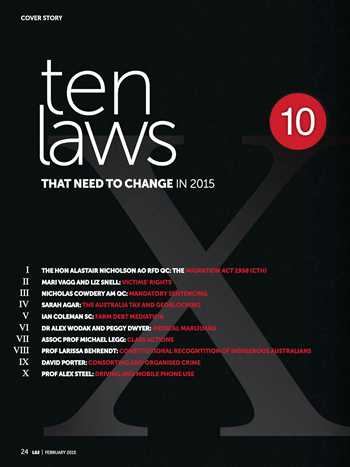
There are many laws across the state (New South Wales) and the country that are subject to the scrutiny of the legal profession. Key legal professionals give their views on the laws that need to change - and why
edited By Klara Major and Jane Southward, Law Society Journal, February 2015 pp.24-35.
The following extract is reproduced with the permission of the Law Society Journal.
I. Asylum Seekers, Children and the Migration Act 1958 (Cth)
by the Hon. Alastair Nicholson AO, RFD, QC
The many changes made to this legislation over the years since the 1990s, culminating in the recent Migration and Maritime Powers Legislation Amendment Act 2014, have produced a situation where the Migration Act 1958 and the policies behind it are among the most regressive and unfair in Australian history.
They rank in infamy with the Stolen Generation and the historical ill-treatment of Aboriginal and Torres Strait Islander people and the White Australia Policy. Indeed they reflect aspects of the White Australia policy.












